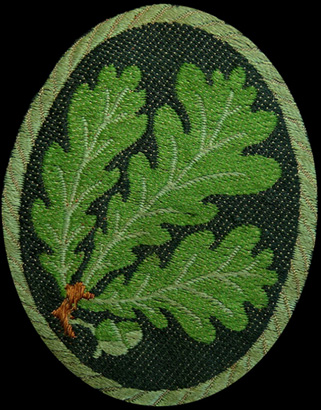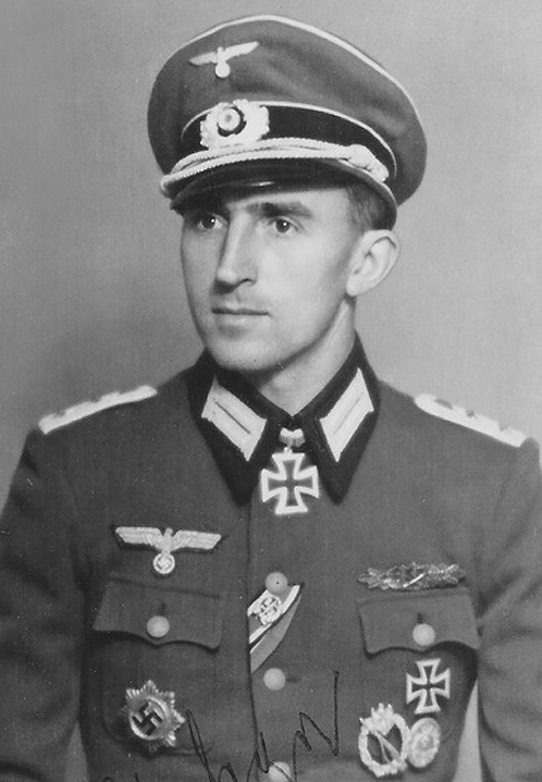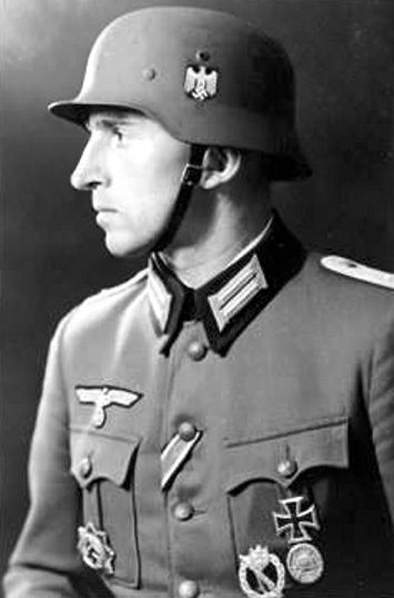

Interview with Captain Otto Heger, winner of the Knight's Cross, German Cross, and Honor Roll Badge, Jäger Regiment 227, Leoding, 1989.



Interview with Captain Otto Heger, winner of the Knight's Cross, German Cross, and Honor Roll Badge, Jäger Regiment 227, Leoding, 1989.

It is nice to meet you finally, if I can I would like to ask a few questions about your service time. Can I start by asking how an Austrian came to serve in the German army?
Otto: Well young man it is not as uncommon as you may think. My family hails from the eastern part that no longer exists. After the first war the land was formed into Czechoslovakia and then in 1938 became part of the new Reich. I ended up in this region because at the end of the second war all Germans were expelled from these areas. Austria is my home, so I am in this part now. We lost many family members during the forced removals of 1945/46.
Austria has many things in common with Germany; we speak the same type of language, share the same culture, and are basically one people. When Hitler came to power in 1933, he made a promise he would unite all German speaking peoples under one Reich, he fulfilled that promise in 1938.
I even came into the SA as I was taken in by it all back then. We believed we had been wronged by Versailles and Hitler was going to put it back in order. The area I came from was bad for Germans before all of this you see, the Czechs felt we should give them loyalty even though Germans were forced to be a part of their country.
For Germans who still yearned to be a part of their former nation, there were problems. The Czechs formed bully squads to go after farmers and businesses who did not cooperate with them. It was like a mafia racket, where you pay extra for the Czechs to protect you. Germans held the better standards of living as they did most of the developing and building in this area. The Czechs wanted to ride in on the coattails of Germans.
This was resented by Germans there were fights and riots, where many Germans were killed during these times leading up to 1938. After Hitler freed this area then the shoe was on the other foot for these Czechs, but surprisingly they were treated very well and with compassion. Of course any criminals were dealt with by going to the camps, but there was no real revenge.
When all this came about I decided I wanted to serve the new Reich and was placed into the army after taking the necessary tests. My brother and I both went to serve the Reich; he fell in Italy in 1944 fighting your nation's soldiers [USA].
I understand you are a Knight's Cross winner, along with the German Cross. Can I ask how it felt to you to win these awards?
Otto: Oh yes these shiny things sure do catch attention, but not like they did back during the war. As an officer I was a leader of my men and we saw pitched battles together. For my wounds, leadership, and victories these medals tell my story. As an officer leading my men I was only doing my duty and trying to keep them alive by surviving the enemy. These awards stand as a testament to the sacrifices of my men more than anything else.
Yes I was a winner of the Knight's Cross in 1944, and I have the German Cross in Gold. I was a well-decorated officer you could say. Back in those days these were all badges of honor worn with pride and had the admiration of the people. Today not so much, we are a dying breed whom history will forget. Our own kin have no desire to relive our history. Many of these medals are in the hands of former enemies, taken as trophies at war's end.
I wore my decorations with pride during my service time, and was honored to have been awarded them. There was a great deal of pomp and circumstance when they were given out. There was a big fanfare when the Knight's Cross was awarded, many of the early soldiers had meetings with Hitler and then were sent on tours for a long holiday away from the front.
Not so with me, I was in the thick of fighting at the end and had to remain with my men, there was no long holiday or tour of the homeland. Towards the end of the war leave was impossible as the lines were fluid and moved often, as well as many areas being taken over by the enemy.
Can I ask how you feel about the German armed forces being portrayed as the bad guys?
Otto: Well if it comes from the victors of the war then it is all true, no? I was in the Balkans when the partisans were strong, they fought as soldiers in organized brigades, but when the people aided them, and in turn helped kill comrades, what option was there? I saw the cruelty of the fighting and yet we could do nothing to stop it, those who committed crimes walked away as heroes.
I became so angry at the way our enemies fought the war, but at first we had many constraints, it was only later these were lifted. These measures are what got many soldiers, especially the SS, into trouble afterwards.
I will say that we did have very good soldiers who many saw as the good guys. They acted decently and with mercy. I served in France and saw some very kind acts from our soldiers. One old hare who was a veteran of the first war stopped by to see an old flame he met in 1916.
She still lived in the town but needed food as the supply chain broke down. He and his comrades gathered plenty of food to last her and the town for many days. The large amount of prisoners we took were all treated as long lost friends by many, I would see card playing, drink sharing, and comradeship with our men.
A French officer told me he was thankful for the good treatment given that France had started the conflict by declaring war. We had a glass of wine and drank to peace and friendship. Could you believe that some of the French cheered us as we moved through their towns? I was curious and asked why; many were upset at the war, and admired Hitler and the economy of Germany. They thought we would bring the same to them, it had been bad under Daladier and many hated him.
So while I was not everywhere on the fronts, I can state I was witness to kind acts of my men. No abuse would have been tolerated, and we were always around civilians in some capacity. As I say I was not everywhere so cannot speak for other units, many are today accused of abuse.
[Above: Award ceremony of the Knight's Cross and Close Combat Clasp in Silver for Feldwebel Kuno Zipfel (Zugführer in 1.Kompanie /I.Bataillon/Jäger-Regiment 56/5.Jäger-Division), which was held on September 14, 1944.
In this photo we see Zipfel (far left) wearing a Jäger oakleaves arm patch and his comrade shaking his hand wearing the oakleaves cap badge. Click to enlarge.]
You served in the east I am told, can I ask your thoughts on the Russian soldier and civilians?
Otto: They are two groups remember that. The soldiers fought us with tenacity and bravery, the civilians were stuck behind the lines and had to undergo occupation. I went through that winter of 1941, it was brutal I recall. I had never seen so much misery up to that point. Many units did not have warm clothing and the men froze. We had to live in the huts with Russians.
They would often give what they could; you would see the men dressed in all kinds of clothing, men's, women's and children's. We wore anything to stay warm from the record cold. Water would freeze within a minute on some nights. Animals had it bad as well. We had to light fires just to warm their water, and our engines.
Many civilians who had been displaced during the fighting now came back, and we could not help but to be drawn into their misery as well. I heard many stories of them settling down with the rear soldiers and cooking and looking after the sick. The Russians have told a different tale since the war. They have said German forces and our allies killed and abused many civilians, killing millions. If this happened I do not know how or when, we were too busy fighting the war to worry about killing civilians. Even up to 1944 we had good interactions with them, the farmers always traded with us so we could have milk, eggs, or vegetables. I just am puzzled as to why I never saw any of this abuse that was supposed to be rampant among our men.
Even with the prisoners I saw compassion. They would be given water or a bite of bread from passing soldiers. Soldiers who are in combat look at their enemy as an equal warrior who is deserving of respect, even if his ideology is flawed. Yet of course I know there were hot heads, every army has them, they had to be watched.
The Russians used exploding bullets which cause very bad injuries; if a prisoner was caught with these they were sometimes shot. Also I should say that if a political officer was captured they did not have a good fate. Many of them were Jews and were either shot by our security men, or auxiliaries would demand them for trial and execution.
We saw how both the Russians and Ukrainians treated any Bolsheviks they caught. They hated them with a passion. I will say that even as repulsive as it was, some did deserve their fates, there was cruelty that deserved to be punished. Let me tell you of this experience so you understand.
There was a village where we stopped for a rest during the advance of 1942, it was empty but once the citizens saw we settled in they came back. The Soviets attacked us one day and shelled the village first, catching us by surprise. No one could safely leave or they could be hit. We were forced back, and I was saved by providence.
While we were getting our important documents, a lone Russian broke out of a tree line and stood no more that 15 meters from me; he fired at me with his machine pistol, which jammed after a burst. A bullet went through the side of my tunic, and missed me by centimeters. A soldier close by saved me from another burst.
When we retook the village, the Soviets had burned it down, we saw the men had been shot in the back of the head and left in the road. A child survivor told us that a political officer had them shot for helping us as an example. This set the tone for what came later on, when they were turned over to others for punishment.
Would you mind if I asked your thoughts on the Allied claims regarding war crimes committed by German forces? Do you feel they are justified?
Otto: War is war, it is a terrible thing and bad things happen. Commissions were formed right after the war to investigate the claims that came in from all over Europe. The Soviet Union spread many claims that have been largely dismissed or disproven. The claims made in the west were investigated by many and some proven to be either justified reprisals, or accidents and not acts of terror. Those men who were guilty of doing such things have been punished, many being jailed or executed. If German arms are guilty of killing innocent civilians on purpose out of anger, then we bear the shame. It is important I believe, to remember that we had strict orders to treat civilians well. If there were reprisals, they had to be carried out in accordance with the rules of war.
A woman I met in the '50s who fled Russia with us, told me she saw nothing of the crimes the Allies spoke about. She said she was in Kiev, and only saw kind treatment by all German soldiers, even the Waffen-SS.
I must say I also never saw any mistreatment of the civilians, on any front. There were times we may have inconvenienced them by having to occupy their homes, but that was out of necessity. Any soldier who stole from civilians was harshly reprimanded and ordered to pay back the person double in my unit. We had no big problems. The only issues I had to deal with were sexual where the men would fall for the women, married or not.
We had to be careful not to give the impression our men were allowed to run wild. Stealing, assault, adultery, and looting were not allowed and punished if found out. So while I can not say precisely that all German units behaved, I know my command did. It is shameful that a few rotten apples can ruin the whole barrel.
Do you think East and West Germany will ever be united again?
Otto: Oh my, that is the big question for all to answer. Kohl has done a good job of keeping up relations and we have seen a desire to be united. Your president Reagan did a lot of good for Germany; he called for the wall to be torn down and for the evil empire to be peacefully overthrown. The people want peace and no more war, with this we may see something happen, there is already unrest in the east.
If Germany does get to reunite it would be a good thing for us, but we will never again rise in Europe like before.

[Above: Captain Otto Heger.]